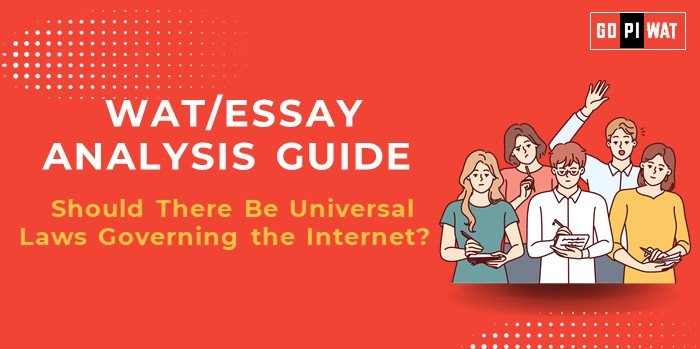📋 Written Ability Test (WAT) Analysis Guide: Should There Be Universal Laws Governing the Internet?
🌐 Understanding the Topic’s Importance
Universal internet laws could harmonize global efforts to combat cybercrime, protect user privacy, and ensure a fair digital ecosystem. Such frameworks are pivotal in fostering economic and social inclusivity while addressing governance fragmentation in the digital age.
📝 Effective Planning and Writing
- ⏱️ Time Allocation:
- Planning: 5 minutes
- Writing: 20 minutes
- Review: 5 minutes
- 📋 Preparation Tips:
- Research global efforts like GDPR and the Budapest Convention.
- Note critical challenges such as sovereignty and enforcement issues.
🎯 Introduction Techniques for Essays
- ⚖️ Contrast Approach: “While global internet users exceed 5 billion, governance frameworks remain fragmented, leaving critical issues unaddressed.”
- 🔧 Solution-Based Approach: “Universal laws can be the key to addressing cybercrime and enhancing user trust in the digital age.”
📊 Structuring the Essay Body
Paragraph 1 – Achievements:
- 📜 The GDPR (General Data Protection Regulation) has set benchmarks for privacy rights globally.
- 🌍 The Budapest Convention facilitates international cooperation against cybercrime.
Paragraph 2 – Challenges:
- ⚖️ Fragmentation: Diverse national laws lead to inconsistency and compliance challenges.
- 🌐 Sovereignty Concerns: Countries resist relinquishing control over internet governance.
Paragraph 3 – Future Outlook:
- 📜 Propose scalable and inclusive regulatory models that respect sovereignty.
- 🤝 Encourage global collaborations to develop baseline standards, leveraging frameworks like GDPR and cybersecurity measures from Estonia.
📖 Concluding Effectively
- ⚖️ Balanced Perspective: “Universal internet laws can bridge gaps in governance, but their success depends on inclusivity and adaptability.”
- 🌍 Global Example Approach: “Drawing from GDPR and the Budapest Convention, a phased approach to universal laws is the need of the hour.”
📄 Sample Short Essays
1. Balanced Perspective: “Universal laws can harmonize digital standards globally but must accommodate local nuances for equitable application.”
2. Solution-Oriented: “Establishing baseline universal laws, akin to the GDPR, can enhance cybersecurity and user trust.”
3. Global Comparison: “Universal internet laws must emulate successful frameworks like Estonia’s cybersecurity policies while respecting sovereignty.”


